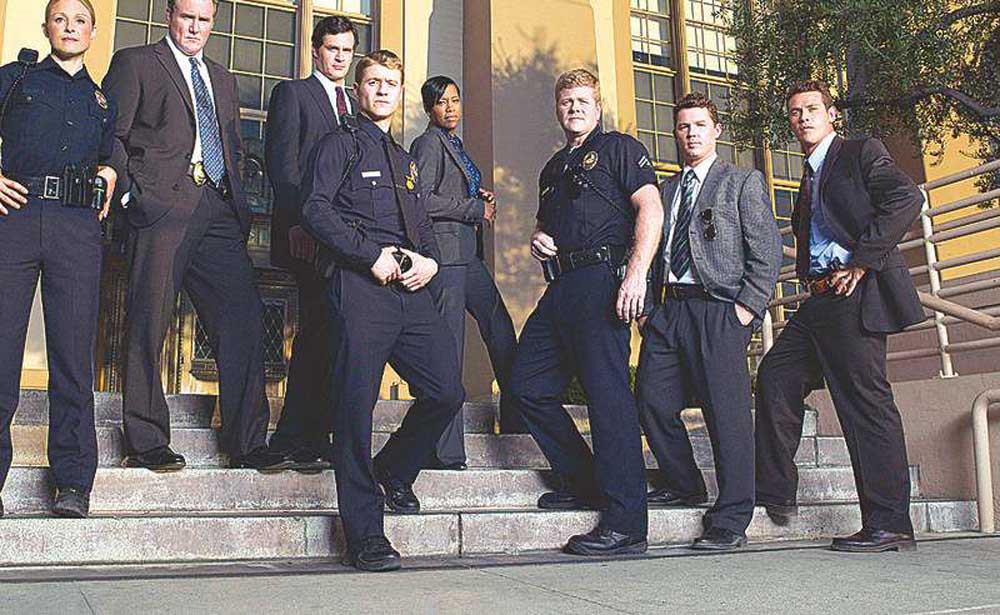‘Southland’ a cop show that cops watch
Published 4:00 am Thursday, February 28, 2013

- The cast of “Southland” shortly after the series premiered in April 2009. After being canceled by NBC and picked up by TNT, the Los Angeles police drama started its fifth season on Feb. 13.
“Southland” 10 p.m. Wednesdays, TNT
Most of us have no way of judging how realistically television shows portray the lives of police officers. If you scan websites where law enforcement professionals gather to chat, however, you can assemble a list of series that get some grudging praise for being slightly more authentic than the norm: “Adam-12,” “High Incident,” “Hill Street Blues,” “Homicide,” “The Wire” and — many a deskbound cop’s favorite — “Barney Miller.”
Trending
When it comes to current series, perhaps the most often mentioned is TNT’s Los Angeles beat-cops-and-detectives drama, “Southland,” which began its fifth season this month. Civilians may not be able to gauge the show’s verisimilitude with any certainty, but television watchers can attest that it feels more real than any other cop series at the moment.
This is partly a matter of technique — an expert melding of hand-held camera work and jittery editing to achieve a restless immediacy — and partly a matter of writing. Under the supervision of the executive producers Christopher Chulack and John Wells (who worked together on another show cops profess to like, “Third Watch”), the dialogue is mostly plain-spoken, and the story lines, which give the patrol officers equal time with the detectives, have a carefully constructed appearance of everyday randomness.
Success for the overworked, mostly dedicated characters is not guaranteed, and at times it’s close to illusory, an unusual state of affairs among mainstream crime dramas. The foot pursuits that have become a trademark of the show exact a painful toll of bruises, bloody noses and dangerous wounds. Miraculous coincidences aren’t unheard-of, but neither are they a weekly occurrence.
If you haven’t caught on to “Southland” yet, the time may be approaching when you’ll need to do it through DVD sets or streaming video — the show’s realism, no matter how artfully achieved, has not helped its ratings. TNT rescued “Southland” after its lowly rated first season on NBC, but the numbers have only become worse.
In Season 5 of “Southland” several major characters have been behaving in ways bound to alienate both fellow cops and casual viewers. Officer Ben Sherman (Benjamin McKenzie), recipient of an award for bravery, has begun to exhibit a self-righteous, gung-ho bluster that has turned off his more skeptical partner, Sammy (Shawn Hatosy). Detective Lydia Adams (Regina King), testy at the best of times, has been driven so far around the bend by her new baby that she can barely bring herself to enter her house at the end of a shift.
And a show that has always tended toward the downbeat has been even more bleak than usual. In the first two weeks, pragmatic but questionable decisions by cops have led to the deaths of an old man and a young boy. Adams has lied to a rape victim to trick him into admitting he’d been raped; Officer John Cooper (Michael Cudlitz), the show’s moral bellwether, has been forced to shoot a man in the back when a traffic stop went bad. One character’s mother has died; another’s lover has left him.
Trending
“Southland” is not a perfect show, by any means, and sometimes it balances its gloominess with epiphanies that are undeniably pat, if not excessively heavy-handed by the standards of basic cable. As the seasons have passed, its lapses into preachiness and formulaic plotting have increased.
Weaving two or three seemingly everyday story lines into a satisfying narrative every episode is a delicate trick, and when it doesn’t work, you’re left with something that feels inconsequential. The temptation to resort to proven dramatic and emotional strategies — that is, melodrama — must be strong.
But “Southland” still gets it right most of the time, and stands above the more popular police and forensic dramas that satisfy our appetite for predictability while insulting our intelligences.
It acknowledges the arbitrary, contingent, inexplicable nature of human behavior in the way its stories circle and lurch and stop midstream, and in the way it crowds the frame with unnamed cops and masses of angry or bored or hyped-up bystanders. It pays attention to everyday conversation, and disdains the haiku of superhuman detection and analysis that substitutes for dialogue and action on other shows.
Most important, it does right by its actors, many of whom are better on “Southland” than they’ve been elsewhere. King and Cudlitz have been exemplary since Season 1, and Dorian Missick, as Adams’ remarkably levelheaded partner, has been their equal since he joined in Season 4.
Like most cop shows, “Southland” posits a daily face-off between idealism and cynicism that’s probably pretty far removed from anything a typical police officer confronts. But it keeps the line between them fuzzy.
When Cooper’s new partner has a meltdown in the line of duty and says, “You have to be crazy to want this job,” there’s no speech or lecture in reply. Cooper just murmurs, “You don’t have to convince me,” and walks away.








